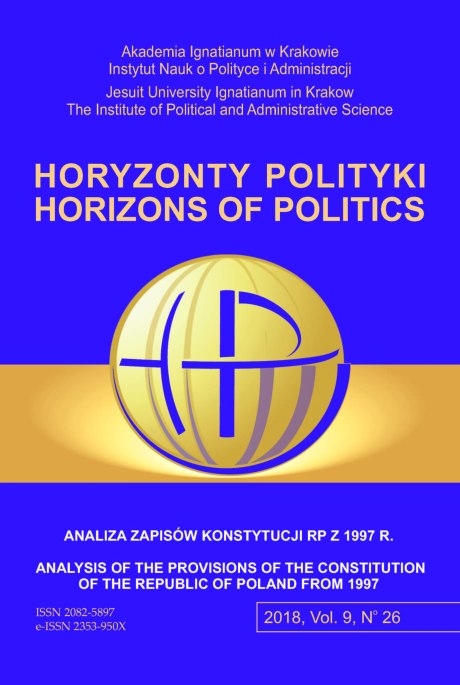Demokracja bezpośrednia w Konstytucji RP 1997 r.
Direct Democracy in Constitution of the Republic of Poland of 2nd April 1997
Author(s): Maria Marczewska‑RytkoSubject(s): Constitutional Law, Political history, Government/Political systems, Transformation Period (1990 - 2010)
Published by: Uniwersytet Ignatianum w Krakowie
Keywords: democracy; direct democracy; referendum; citizen initiative; constitution of Republic of Poland;
Summary/Abstract: The purpose of this article is to present the institutions of direct democracy in Constitution of the Republic of Poland of 2nd April 1997 in relation to previous constitutional solutions in Poland. The research problem and methods: Direct democracy in Poland has a comparatively short history. During the interwar period such solutions were not known in Poland. Similarly, they were not provided in the 1952 Constitution. The analyze of the institutions of direct democracy in the Constitution of Republic of Poland of 2nd April 1997 is important in this context. The process of argumentation: The article presents the following issues: 1) legal solutions before 1987; 2) legal solutions in the period 19871997; 3) national referendum in the Constitution of the Republic of Poland of 1997; 4) citizen initiative and local referendum in the Constitution of the Republic of Poland of 1997. Research results: The current Constitution of 1997 provides for three kinds of national referendum: 1) constitutional (Article 235 par. 6); 2) ratification referendum (Article 90 par. 3); 3) referendum in respect of matters of particular significance to the State (Article 125 par. 1). The Constitution includes the local referendum as a form of direct exercise of power in Article 170. According to Article 118 par. 2 the right to introduce legislation shall also belong to a group of at least 100,000 citizens having the right to vote in elections to the Sejm. Conclusions, innovations, and recommendations: A national referendum is treated as an exceptional procedure listed after the principles of operation of the Sejm and Senate. The right to order a referendum is vested only in the Sejm and in the President acting with the consent of the Senate. The resolution to hold a referendum is adopted by an absolute majority of votes with the presence of at least half of the statutory number of Deputies. It is difficult to receive political consensus for referendum. A lot of questions and legal solutions need to rethink and discuss.
Journal: Horyzonty Polityki
- Issue Year: 9/2018
- Issue No: 26
- Page Range: 51-61
- Page Count: 11
- Language: Polish

